Introduction
 Indian Folk Music encompasses a wide variety of musical styles which defy any definition. It is a rather popular genre of music which has captivated music lovers since the remote past with its rhythm, tune, lyrics and pulse. Essentially, folk music of India is a community-based style of music dealing with some kind of social discourse or feelings of the singer and situation. The great diversity that prevails in India culture and civilisation has greatly facilitated the origins and establishment of the folk style of music. Every region of India has its own distinctive style of music. These folk songs are full of rustic charm and appeal. They have simple and touching lyrics which have an immense appeal for the rural masses.
Indian Folk Music encompasses a wide variety of musical styles which defy any definition. It is a rather popular genre of music which has captivated music lovers since the remote past with its rhythm, tune, lyrics and pulse. Essentially, folk music of India is a community-based style of music dealing with some kind of social discourse or feelings of the singer and situation. The great diversity that prevails in India culture and civilisation has greatly facilitated the origins and establishment of the folk style of music. Every region of India has its own distinctive style of music. These folk songs are full of rustic charm and appeal. They have simple and touching lyrics which have an immense appeal for the rural masses.
Most of the folk music of India is dance-oriented. This means that the songs that are sung are usually accompanied by some dance form, typical to the region in which it is being performed. There is no definite system of education that is imparted in the genre of folk music. It is a style that is picked up and followed and thus the tradition of folk music has mainly been aural. `Desi folk`, as it has been termed, is viewed as a classical art form where in the midst of dance, mime, lasya and natya the symbolic attributes of traditional Indian culture finds a definite diction.
History of Indian Folk Music
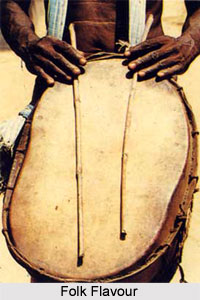 History of Indian folk music has a unique tale to tell as, it has, over the years, developed an elaborate flexible melodic character. From one end to the other, it has influenced the music of the common man of India. Despite the fact that India is home to variety of races with diverse musical traditions, a uniform cultural mode of expression of monolithic character can be discerned among the population. Folk-music is a part and parcel of this system.
History of Indian folk music has a unique tale to tell as, it has, over the years, developed an elaborate flexible melodic character. From one end to the other, it has influenced the music of the common man of India. Despite the fact that India is home to variety of races with diverse musical traditions, a uniform cultural mode of expression of monolithic character can be discerned among the population. Folk-music is a part and parcel of this system.
Folk-music of India adheres to monophonic structural system. According to scales of modern raga modes, the classification of music will prove more suitable. Ancient music and folk-music are based on their respective techniques, derived from elementary methods of formative processes of the general system easily explainable through Indian musicological principles. It is true that connecting links between folk-tunes and ragas have not been properly established as yet. And these features are important facets of this discipline.
But it can be seen that the folk-music of West Bengal and adjacent Indian states actually belongs to the same stock as is in vogue in other parts of the country, having originated somewhere at a certain stage and hybridized and developed later. They are akin to the basic system and are understandable by application of the same basic principles.
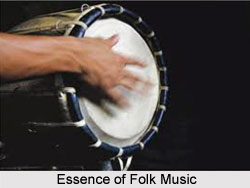 As per legends, folk-lore in India has its primordial source in the Vedic literature, so also has the folk-music Folk-ballads of the Rig Veda. Vedic gathas in the Satapatha Brahmana and Aitareya Brahmana are the earliest specimens of marriage songs, the types of which were used by folk people. All this information dates back to 1500-500 B.C. No direct information about primitive music and folk-music is normally available. In the Vedic age, the people of the higher society endeavoured to tame Asuras-Raksasas, and divert their attention to their own. These are but general ideas about conversion of folk and local tunes into standard music.
As per legends, folk-lore in India has its primordial source in the Vedic literature, so also has the folk-music Folk-ballads of the Rig Veda. Vedic gathas in the Satapatha Brahmana and Aitareya Brahmana are the earliest specimens of marriage songs, the types of which were used by folk people. All this information dates back to 1500-500 B.C. No direct information about primitive music and folk-music is normally available. In the Vedic age, the people of the higher society endeavoured to tame Asuras-Raksasas, and divert their attention to their own. These are but general ideas about conversion of folk and local tunes into standard music.
There are some of the local folk tunes that have been turned into ragas, and most of these ragas have been named after countries, people or tribes from which the tunes have been collected. Evolved either from the tribes or from the people of different regions, the ragas are: malava-kaisika (raga malkauns) or maluh derived from Malav/Malaya/Malla, Takka or Tanka from the Takka tribe of Taxila, saka (Saka/Sakatilaka) from the Kushanas art, Pulindi from the Pulindi tribe, ahiri from Ahira tribe, bangal from Bengalis, andheri from Andhrades, bhotta originating from Bhottades or Tibet, gurjari from the Gujarat; bhairabi from Bhiraba tribe and so on. Eventually, however, many names appeared which prove how folk-tunes of different lands and music of different tribes have been incorporated and formulated as ragas. This process continued for a long period through different ages.
The history of ragas can be traced down to middle ages, fifteen hundred years back from the present century. During the course of its development for all these years the raga music, which is the Indian official music, has undergone a series of structural changes, and its current form is not more than six hundred years old. The continuous incorporation of several tribal and folk musical forms in its list has been a striking feature. When folk-music took a natural shape in the practical field, Indian musicologists started talking about reformed local melodies.
Themes of Folk Music in India
Folk music is an indispensable part of functions such as childbirth, wedding, engagement etc. There are a number of songs for such occasions. Due to the nature of their lifestyle, and the priority of agriculture in the lives of the rural people, there are a number of songs associated with agricultural activities like planting and harvesting. The villagers give vent to their hopes, fears and aspirations by means of these songs. Folk music is also sometimes employed for educational purposes, such as instructing a girl about womanhood.
Instruments used in Folk Music in India
The kind of musical instruments used in folk music are quite different from the type used in Indian Classical Music. They are not as refined as the ones used in classical music. The most distinct feature of these instruments is that they are usually crafted by the singers themselves. They use commonly available materials such as bamboos, coconut shells and pots to make these instruments. Usually, cruder forms of instruments like dholak, dhaf, nal etc are used. In the places of classical string instruments like the sitar and sarod, much simpler versions such as the ektara, dotar, saringda etc are used. Apart from these, there are also a number of instruments which are used only in particular styles of folk music. Most of these instruments have their own name in the local dialect.
Though folk music in India had undergone a decline with the arrival of movies and pop music, cheaply recordable music has made it easier to find and helped revive the traditions. Folk music has influenced Classical music to a great extent, though the latter is viewed as a higher art form. The various styles of folk music and the various instruments used have impacted classical ragas. Many well known singers also prefer to sing Thumri, which is semi-classical in nature.
Folk Music of South India
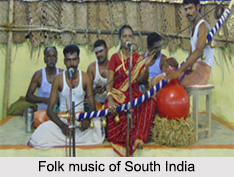 Almost all the states in southern India have developed a unique kind of folk music pattern. These ancient music forms seem to be influenced by the temples in South India. The culture of Southern India is unique, equipped with facets of culture that makes it so remarkable within this country. This culture has highly influenced their folk music which is beyond comparison.
Almost all the states in southern India have developed a unique kind of folk music pattern. These ancient music forms seem to be influenced by the temples in South India. The culture of Southern India is unique, equipped with facets of culture that makes it so remarkable within this country. This culture has highly influenced their folk music which is beyond comparison.
Folk Music of Kerala
Kerala has a rich tradition of folk songs and anthems, a large portion of which are sung in local dialects. With the evolving times, these songs have wound down in fame. Gone down progressively through generations by a vibrant oral tradition, the creation of the vast majority of these songs is obscure. The types of folk music in Kerala are Christian songs, Carnatic, Vadakkanpattu (northern folk), Kathakali and tribal music.
Places like Kochi, Thissur, Varkala, Trivandrum, Kozhikode, Munnar etc. are appropriate to enjoy some folk music. They use Chenda, Edakka, Kombu, Kurum Kuzhal, Maddalam, Mizhavu, Panchvadyam, Pulluvarkkudam, Thayambaka, Thimila, Shankhu etc. during their folk dance or music performances in festivals like Onam, Vishu, Ambalapuzha Arattu, Aranmula Uthrattathi, Attukal Pongala, Adoor Gajamela, Kuthiyottam and Kettukazhcha, Chittoor Konganpada etc.
The language of the songs used for Kathakali is Manipravalam, a mixture of Malayalam and Sanskrit. Even though most of the songs are set in ragas based on the microtone-heavy Carnatic music, there is a distinct style of plain-note rendition, which is known as the Sopanam style. Popular folk songs of Kerala are Mappila Pattu, Knanaya Folk Songs, Ottamthullal Songs, Pulluvan Pattu, Villu Pattu and Temple Music.
Folk Music of Karnataka
Karnataka boasts of a fortunate custom in the domain of folk music and traditional music. The rich legacy of the music of Karnataka can be attributed to the Vijayanagara and Woodeyar rulers who themselves were incredible examples of music and writing. These administrations boosted the development of conventional music and energized promising musicians. With that, Karnataka has made a considerable commitment to the development of the type of Indian classical music which today is known as Carnatic music.
Gopala Nayaka traveled all the way from the south to become the court musician of Allauddin Khilji (1295-1315) in the north. He cultivated the friendship of the Persian musicologist, Amir Khusrau. These were incorporated in the treatise on music by a South Indian composer of the 16th century - Pundarika Vittala. The intermingling of the two cultures gave rise to the two modes of singing- Uttaradi and Dakshinadi or Hindustani and Carnatic.
Janapada Geethe is yet another thriving music form of Karnataka. By combining elements of prose and verse, several folk epics were created. Particularly the tribal people had their own distinct songs and styles to celebrate both social and religious occasions. Noteworthy among the folk music genre are the Vachanas of Basavanna, an ardent Shaivaite whose verses were so lyrical that they got incorporated into Janapada Sangita.
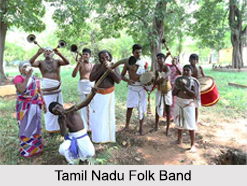 Places like Mangalore, Hampi, Coorg, Bijapur, Mysore, Hubli etc. are appropriate to enjoy some folk music. They use Violin, Veena, Udukkai, Thavil, Shankha, Nadaswaram, Mridangam, Morsing etc. during their folk dance or music performances in occasions like Hampi Festival, Kambala Festival, Ugadi Festival etc.
Places like Mangalore, Hampi, Coorg, Bijapur, Mysore, Hubli etc. are appropriate to enjoy some folk music. They use Violin, Veena, Udukkai, Thavil, Shankha, Nadaswaram, Mridangam, Morsing etc. during their folk dance or music performances in occasions like Hampi Festival, Kambala Festival, Ugadi Festival etc.
Folk Music of Telengana and Andhra Pradesh
Andhra Pradesh is rich in its conventional folk work of art. Folk life and folk workmanship are indivisibly interwoven with each other. Folk music is the music of the majority. Each occasion of life has a special folk tune related with it. They are sung during celebrations, the approach of a new season, the birth of a tyke, or everyday issues from teasing a loved one to appreciating nature. The most loved methods for appreciating someone on any events are folk melodies. There are likewise folksongs on journeys, medication, cremation, marriage, folklore, and cradle-songs.
Jangam Katha is one of the earliest folk ballad forms prevalent in Andhra. Oggu Katha derives its name from the inspiring "Damarukam", called Oggu, which initiates the stories sung by the ballad singers. Several Saiva stories are in the repertoire of the Oggus, though others not connected with Saivism are also sung. Kinnera Katha is a folk ballad form narrated by `Dakkala` community in Telangana to the supplement of a string instrument called `Kinnera`. It has usually seven notes and so is called Edumetia Kinnera. Golla Suddulu is accompanied by a drum and a horn. These `gollas` also participate in reciting a long verse (Dandakam) on religious occasions and offer sacrifices during ritual ceremonies (bonalu).
Places like Vijayawada, Tirupathi, Vishakhapatnam, Lepakshi, Hyderabad etc. are appropriate to enjoy some folk music. They use Violin, Veena, Nadaswaram, Mandolin etc. during their folk dance or music performances in occasions like Deccan Festival, Lumbini Festival, Tirumala Tirupati Festival, Sammakka Saralamma Jatara, Bathukamma etc.
Folk Music of Tamil Nadu
Tamilnadu is profoundly established in an extraordinary tradition of folk art and music, which show the traditions and abilities that have descended from generations. The folk music of Tamil Nadu speaks of the ethos, tasteful values, and tunes of the locale. Traditionally, folk music is conducted during festivals and community gatherings.
Tamil folk music is remarkable for the tala intricacies. Ancient classical ragas or melodies like Manji, Sama, Navaroz, Kalyani, Karaharapriya, Thodi, and Nadanam-k-kria are used in the folk-songs. Many instruments are used in folk music. The hill-tribes have a natural fondness for music and they are known for the preservation of ancient culture. The Pulayar tribe describes their melodies as talams. According to them, their melodies are derived from the cooing of birds such as kanamayil, Kanakkozhi. Talam and melodies are named after their deities. Karaganachi talam, Mangalanada talam, Kundhanada talam, etc. The Kulavai sound is made by the women engaged in agricultural work with a turn of the tongue which they move swiftly side ward. Nayyandi Melam or Chinna Melam is a rustic imitation of the classical melam or Nadaswaram and is intended purely as an accompaniment to folk dance drama to cater to the tastes of the unlettered audience.
Places like Chennai, Kodaikanal, Rameshwaram, Ooty, Pondicherry, Madurai, Coimbatore etc. are appropriate to enjoy some folk music. They use Silappadikaaram, Yaazh, Veena, Thamburas, Vangiyam etc. during their folk dance or music performances in occasions like Pongal, Tamil New Year, Natyanjaili Dance Festival, Thaipusam, Thiruvayaru Festival etc.
From the diverse variety of the Indian musical instruments used in their music to the versatility in vocal range exhibited by the singers, South India effortlessly takes an important position in the enriching of folk music of India.
Folk Music of Northern India
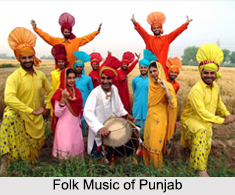 Folk Music of Northern India represents the vast cultural diversity of India. Since ages, numerous types of folk music have evolved in different regions of the country. A variety of songs have been composed in the folk music which accompany different events and moods. Folk Musical Instruments also form a significant part of this age old legacy which make the folk songs even livelier. Several poets and saints have abundantly contributed in this field since ages.
Folk Music of Northern India represents the vast cultural diversity of India. Since ages, numerous types of folk music have evolved in different regions of the country. A variety of songs have been composed in the folk music which accompany different events and moods. Folk Musical Instruments also form a significant part of this age old legacy which make the folk songs even livelier. Several poets and saints have abundantly contributed in this field since ages.
Folk Music of Himachal Pradesh
A variety of folk music has developed in Himachal Pradesh over years which have become an inseparable part of the folk culture of the state. Laman songs are a kind of love song sung especially in Kullu Valley. Another kind of folk songs are Samskara songs which are generally sung by the women of higher classes in festivals and celebrations. Ainchaliyan are sung during weddings in the bride`s house. Another unique folk music sung and played by wandering musicians is Chamba -Pangi.
Folk Music of Punjab
Folk music of Punjab is also famous for their rhythm and uniqueness. Traditional folk songs of this state include Mirza and Heer. The state has compositions for different occasions like festivals, life rituals and many more. Folk romances of Punjab are Mahia, Jindua, Kafian, Jugni, Tappe, Bolian, Sadda and Jindua. Many folk songs of this region are dedicated to bravery. Islam in Punjab practice Qawwalis, Hamds and Naats.
Folk Music of Jammu and Kashmir
Jammu and Kashmir has a rich legacy of folk music. The folk songs of this region are popular for their enchanting memories. Chakri is one of the most famous folk songs of Jammu and Kashmir in the form of which fairy tales and popular love stories are narrated. The musical instruments accompanying this famous genre of music are sarangi, rubab and Harmonium A form of sarcastic singing is Ladishah that depict the social and political conditions in a humorous manner. Sufiana Kalam is a form of classical music comprising of its own ragas.
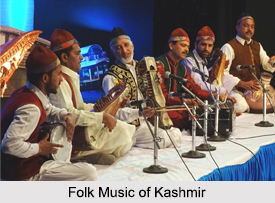 Folk Music of Uttar Pradesh
Folk Music of Uttar Pradesh
Rasiya is the most renowned folk song of Uttar Pradesh. This genre of songs is sung to celebrate the sacred love of Lord Krishna and Radha. These songs are performed mainly during festivals along with large drums.
Folk Music of Uttarakhand
Folk Music of Uttarakhand is deeply associated with nature and in the course of time they have undergone numerous transformations. A variety of songs have been composed for different occasions which enrich the folk culture of this state greatly. Bajuband are songs that describe the love and sacrifice. Basanti are folk songs performed in groups or singly to celebrate the commencement of spring season. Another category of folk music in Uttarakhand is Chhura which is sung by shepherds. Khuded are narrations of suffering of women owing to her separation from husband. During marriage ceremonies, Mangal songs are sung. Chhopati are another type of love songs sung among men and women in the form of questions and answers.
Folk Music of Northern India depicts different phases of life and society. The huge variety in this genre of music represents the social, economic as well as political set up of respective regions. Apart from this, several other themes are also covered by these songs. Folk music prominently showcases the cultural diversity of the country as well as greatly enriches its cultural heritage.
Folk Music of Western India
Folk Music of Western India is acclaimed throughout the country for their beautiful rhythms and melodies. These songs sketch the vivid cultural heritage of the country in a delightful way. Tremendous variety can be found in the Folk Music of Western India and each type of song conveys an important theme. A deep insight into the folk life, socio-economic condition, day to day living love and many other aspects can be found in the folk music. Several great saints and poets have immense contribution in composing these enchanting melodies.
Folk Music of Maharashtra
In western India, Maharashtra has a rich heritage of folk music. The state has provided a number of versatile and talented folk musicians to the country. Among the folk songs of this region, Lavani is highly popular and acclaimed throughout the country. It is mostly sung by female singers and is accompanied by the percussion instrument Dholki. The song is characterized by powerful rhythm and fast tempo. Other folk songs of Maharashtra include Gondhals and Bharuds.
Folk Songs of Gujarat
Gujarat is famous for its lively folk culture and the folk music of this state forms an integral part of it. A variety of songs prevail in the state which are sung during different occasions. Bhajans of this region include an array of compositions namely Dhol, Katari, Prabhati etc. Certain folk songs of Gujarat depict stories along with the music. Such songs are popularly known as Sorathaa, Bellads, Duha and Chhand.
Folk Music of Goa
Goa has produced some of the most appealing and melodious folk songs that spice up the folk culture of Goa greatly. Banvarh are the folk songs sung in the Hindu religion at the demise of a person. It is a mourning song. A wedding song of Goa, known as Dhalo, is another marvellous composition which has become an intimate part of the tradition of Goa. Dulpod is a song having a quick rhythm that narrates the Goan lifestyle. During religious occasions Fughri is sung. It is popular especially during Ganesh Chaturthi. Launim is a type of folk song that deals with legendary and religious themes. Mando represents love songs and Palnnam is a lullaby, also known as cradle song. Folk music of Goa also includes Ovi which are related to nuptial themes.
Although, a vast variety of contemporary forms of music have emerged in the country, folk music has always succeeded in maintaining its charm over years among the varying musical trends. A variety of Folk Musical Instruments accompany these songs making them even more vivacious and beautiful. Be it a celebration, a festival, mourning or a religious ritual, Folk music of Western India offers songs that suits to different moods and occasions. They also play a significant role in enriching the culture and traditions of the country.




















